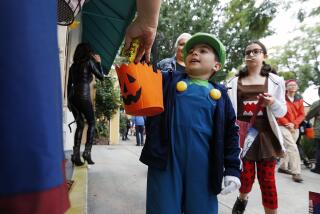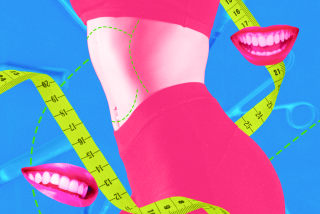On Halloween or after, don’t fat-shame kids

A Fargo, N.D., woman says she will give trick-or-treaters that she deems “moderately obese” a “fat letter” instead of candy on Halloween.
- Share via
Instead of candy corn or a Jolly Rancher in your kid’s Halloween bucket this year, you may end up with a note.
A woman in Fargo, N.D., has been handing out messages to “moderately obese” kids instead of trick-or-treat candy, instructing them to lose weight. This concerned citizen believes it’s her job to take matters into her own hands, if parents won’t step up and say no to the calories.
The unnamed woman said on the radio: “It’s just really irresponsible of parents to send them out looking for free candy just ‘cause all the other kids are doing it.”
The woman is being criticized for her decision, with many calling her a bully and telling her to stop fat-shaming children.
I agree. It won’t solve anything. Although it’s honorable of her to care so much about public health, behavior like this will only further children’s existing anxiety about food.
Research shows that children as young as 3 are already learning to internalize harmful messages about their weight. During one study, children ages 3 to 5 were given the choice of playing with “fat” or “thin” dolls. The figures that the kids identified as being “fat” were overwhelmingly shunned. No one wanted them.
The data also suggest that the ways in which we perceive body image also shape what we think about others. In that study, children were more likely to ascribe positive characteristics to thin people, whom they thought of as friendly or “nice,” and fat people to be “mean.”
When kids are looking for potential friends, findings suggest that obese kids are less likely to be picked than any other group, including children who are in a “wheelchair, missing a limb, on crutches [or] disfigured.” These messages don’t come from nowhere, and they stick. As adults, these kids often face mental health issues “worse than that of the chronically ill or even severely disabled.”
In high school, I used to work as a teen counselor in our school’s drug outreach program, similar to D.A.R.E. We worked with middle school students, and I was assigned to fifth-graders. Of the girls in my class, most were already dieting and a few had been to “fat camps.” One had an eating disorder. These girls were 11, and none looked like they had any health issues to me. Was this moderate obesity?
I asked their teacher how a fifth-grader decides to go on a diet, and she explained that they weren’t the ones making the decision. It was their parents, adults as seemingly well meaning as the woman in Fargo.
When I was 11, I was a lot like those girls, unsure about my body and trying to look like the person I was told to be. However, I actually did have weight problems. In elementary school, I developed a habit of eating everything in sight, constantly hungry for more. But instead of telling me to stop, my parents let me eat. I never let a single piece of Halloween candy go to waste, and I turned out just fine. I grew up not afraid to eat, whether it was healthy food or food that’s a little bad for you. Life is about finding the balance.
Growing up is hard enough without taking away the little bit of joy and innocence our kids have left, sucking on that Tootsie pop without a care in the world. Sometimes it’s important to teach our kids a lesson about health, but other times we just need to let kids be kids.
ALSO:
Banning the kimono as a Halloween costume
Halloween warning: Don’t frighten cops with your costume
There’s no reason, or excuse, for blackface Halloween costumes
Nico Lang is a contributor at Thought Catalog and co-editor of the “BOYS” anthology series. Follow Nico on Twitter @Nico_Lang.
More to Read
A cure for the common opinion
Get thought-provoking perspectives with our weekly newsletter.
You may occasionally receive promotional content from the Los Angeles Times.










